DCPA NEWS CENTER
Enjoy the best stories and perspectives from the theatre world today.
Enjoy the best stories and perspectives from the theatre world today.
This article was published on February 22, 2018
Video by DCPA Video Producer David Lenk and Senior Arts Journalist John Moore.
In this daily four-part series for the DCPA NewsCenter, we introduce you to the plays and playwrights featured at the Denver Center’s 2018 Colorado New Play Summit. Over the past 13 years, 29 plays introduced at the Summit have gone to be premiered on the DCPA Theatre Company mainstage season. Today: Kemp Powers, author of Christa McAuliffe’s Eyes Were Blue.
Playwright Kemp Powers looks back on the days leading up to the Space Shuttle Challenger disaster almost with a sense of nostalgia. He was like a lot of American kids growing up in 1986 with their heads in the stars.
“It was a very different time then,” Powers said. “What people don’t realize now is just how amazing it was. The space program was moving, no pun intended, at the pace of a rocket. As kids, we felt like it was only a matter of years before every man, woman and child would be taking a vacation in space the way we fly to Hawaii right now.”
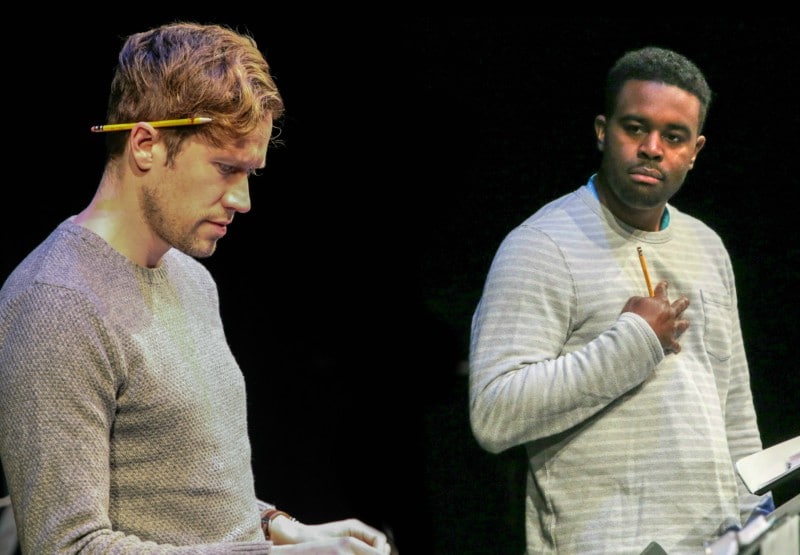
From left: Allen E. Read and Tobie Windham as twins Sevvy and Bear Gentry in ‘Christa McAuliffe’s Eyes Were Blue.’ Photo by John Moore.
All of that changed, of course, on Jan. 28, 1986, the day the Challenger broke apart 73 seconds into its flight, killing all seven crew members — with almost every schoolkid in America watching on live television. One of the dead was Christa McAuliffe, a social-studies teacher from New Hampshire and the first civilian to go up into space. She was the winner of a national contest for teachers, which is why so many classrooms were tuned in that day to witness history — just not that kind of history.
“That moment marked a turning point for the space program,” said Powers. “Christa McAuliffe symbolized a lot of people’s dreams, not just for the space program, but their own hopes for where they were going to go in this brave new world we were entering into as a nation. NASA really pulled back after that, and people turned their attention to other things.”
That’s the backdrop for Powers’ intriguing new (and tantalizingly titled) play, Christa McAuliffe’s Eyes Were Blue, one of four featured works at this weekend’s 2018 Colorado New Play Summit. (Tantalizing, in part, because her eyes were brown.)
The play is pulled from the real headlines, inspired by two real twins in an interracial family — their mother is white and their father is black. But in a genetic twist, one baby came out white and the other came out black.
“The play explores the idea of nature versus nurture — but within one household,” Powers said. “We see the impact when two men are genetically the same but to the entire outside world, one is absolutely perceived as black, and one is absolutely perceived as white.”
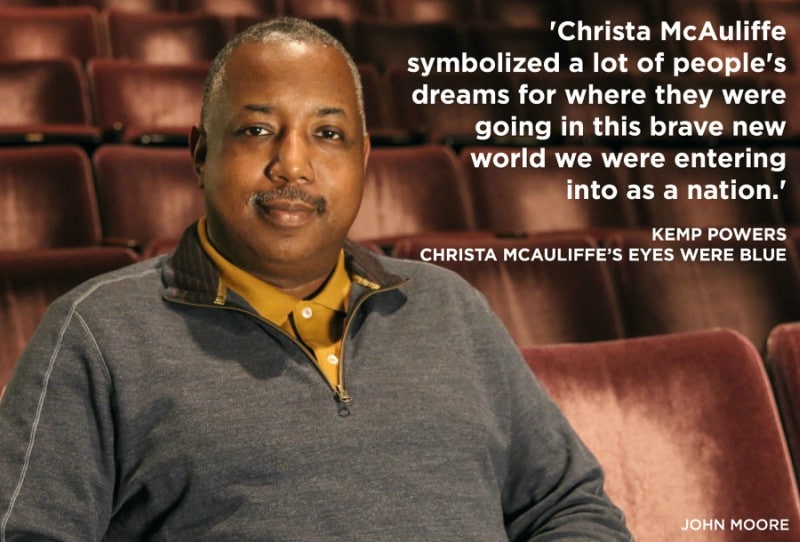
The real story involved two teenage girls in Gloucester, and media coverage when they turned 18 went viral. “There was one news segment where these girls were being interviewed,” Powers said, “and the newscaster, a well-meaning lady, said to them, ‘So you got all of the black parent’s genes — and you got all of the white parent’s genes?’ And they nodded. And then she turns to the white-looking bi-racial girl and says, ‘Well, aren’t you the lucky one?’
And I just sat there and thought, ‘There you go.’ That’s what I want to explore.”
In Powers’ story, the brothers have fallen apart and are forced to confront each other in their adulthood. “And over the course of this confrontation, we learn why they had this tremendous falling out when they were children,” Powers said. And the pivotal moment in the lives of both men comes in the days leading up to the Challenger disaster.
“When Christa tragically died with those other six astronauts, I wanted to parallel the symbolism of when everything went wrong in the space program to the relationship between these two brothers,” Powers said. “Because one of the brothers thinks he’s going to become an astronaut. And he quite literally saw his dreams go up in smoke.”
Here’s more of our conversation with Powers:
John Moore: What can you tell us about the title of the play?
Kemp Powers: I can tell you that this play ultimately deals a lot with bullying. And another big part of the story is that in 1986, one of the books on the New York Times bestseller list was called The Worst of Truly Tasteless Jokes. And until people see the play, I think that’s all I should say about it.
John Moore: Fair enough. So what does it say about the America we live in that these two brothers, who are identical in every other way, ended up in such different futures?
Kemp Powers: When the play begins the brothers haven’t spoken to each other in years and they are brought together in a random moment of fate. I wanted to explore the realities of family in a way that is very familiar to me, but I don’t often see. In some families, as you get older, there’s some unspoken grudge that goes on and on until eventually you really have nothing to do with each other. Here’s what fascinates me: What happens when that grudge has a racial component, and one brother feels like the other one let him down?
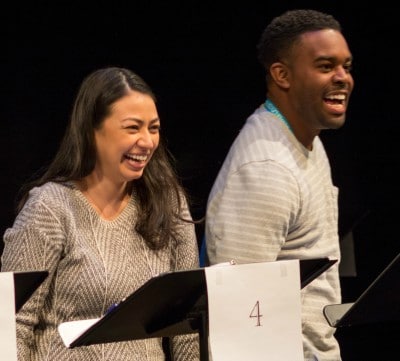
Natalie Camuna and Tobie Windham. Photo by Adams VisCom.
John Moore: And what’s your stake in all of this?
Kemp Powers: This is probably the most personal thing I’ve ever written because it’s largely set in and around the Brooklyn that I grew up in.
John Moore: Tell us about that Brooklyn.
Kemp Powers: I’ve always been a big fan of theater. Growing up in New York City, theater was kind of always in the background for me. I think my first Broadway show that my mother took me to was La Cage Aux Folles, which I believe was in 1983. I was 10 or 11 years old. I didn’t even know what Broadway meant then. That was a pretty powerful, impactful moment in my life. The first non-musical I saw was a production of Shakespeare’s The Tempest that we went to at the Public Theatre when I was in sixth grade. If you grow up in New York, theater is just part of the culture. But I never thought it was something I’d actually be able to do.
John Moore: Tell us about your transition from your previous profession to playwriting.
Kemp Powers: I was a journalist for more 15 years. When I got into college, I displayed some skill as a writer, and I immediately turned that into journalism because I’m a pretty voracious reporter and researcher. My research is often evident in what I’m writing, and I’m actually trying to make it less evident.
John Moore: And what is your history with the DCPA Theatre Company?
Kemp Powers: My relationship with the Denver Center started when they produced my play One Night in Miami… in 2015. And then when (former Artistic Director) Kent Thompson commissioned me to write a new play, my first question was, “What do I need to write?” And he said, ‘Whatever you want.’ So I took that as a unique opportunity to write about a subject that under normal circumstances would be more challenging to pitch to a theatre company. I wanted to stretch myself as a storyteller with this play.
John Moore: One Night in Miami … was your first play, which still boggles me. It imagines what happened the night Cassius Clay met in a hotel room with Jim Brown, Sam Cooke and Malcolm X in 1964. That was obviously a landmark production here in Denver and around the world. What did it mean to you when the play was performed in South Africa?
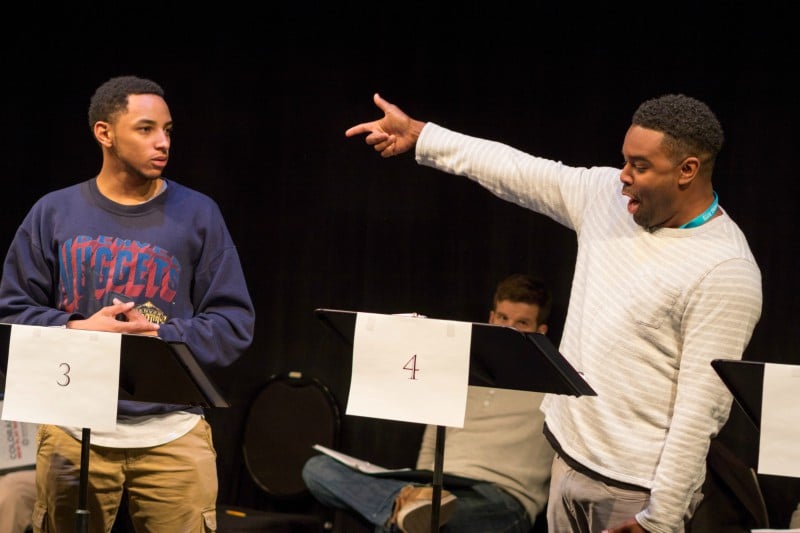
Quinn Marchman and Tobie Windham. Photo by Adams VisCom.
Kemp Powers: Oh, I can’t put it into words. I mean, it’s running in Johannesburg right now. And it ran in London a year ago. And yes, that was my first play. I think all playwrights at some point are overcome with a certain amount of what I call ‘impostor syndrome.’ That’s when you ask yourself, ‘Am I good enough to be doing this?’ ‘Will anyone get the story I’m trying to tell?’ But the journey of that play was incredible because everywhere that it went, it seemed to connect with its audience. I was actually pleasantly surprised by the response to the play here in Denver because that was an audience that largely didn’t look like the characters represented in the play.
John Moore: They were white.
Kemp Powers. A lot of them. But they were still able to connect so deeply with those characters. That was really special.
John Moore: You have regularly attended the Colorado New Play Summit as an audience member, but this is your first as a featured playwright. How does the second week of development perhaps set this festival apart from others?
Kemp Powers: The second week is tremendous. I mean, you’re almost getting as much rehearsal with the actors here at this Summit as you get for a fully staged production. The first day or so you feel stressed and rushed. But by Day 3 or 4, you realize how luxurious this whole process is.
John Moore: What do you learn from having that first public reading at the end of the opening week?
Kemp Powers: It’s thrilling to have the play be heard by an audience because at a certain point there’s only so much you can discover when you’re sitting alone in a room writing. There’s so much more you get to discover when you put it in front of a live audience. And then you get to go back and recalibrate. And if you want to take a completely different stab at it, you can. That’s really exciting for me. I’m accustomed to festivals that are just one weekend, and you only have a few days of rehearsal. You don’t get to explore the play as deeply as you do here.

The cast of ‘Christa McAuliffe’s Eyes Were Blue.’ Photo by John Moore.
Christa McAuliffe’s Eyes Were Blue: Cast list
Written by Kemp Powers
Directed by Nicholas C. Avila
Dramaturgy by Jerry Patch
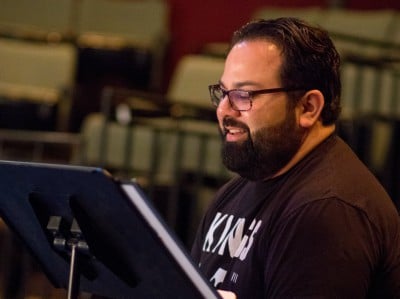
Director Nicholas C. Avila. Photo by Adams VisCom.
Stage Manager: Rick Mireles
Stage Management Apprentice: Mariah Brown

Leave a Reply
Want to join the discussion?Feel free to contribute!